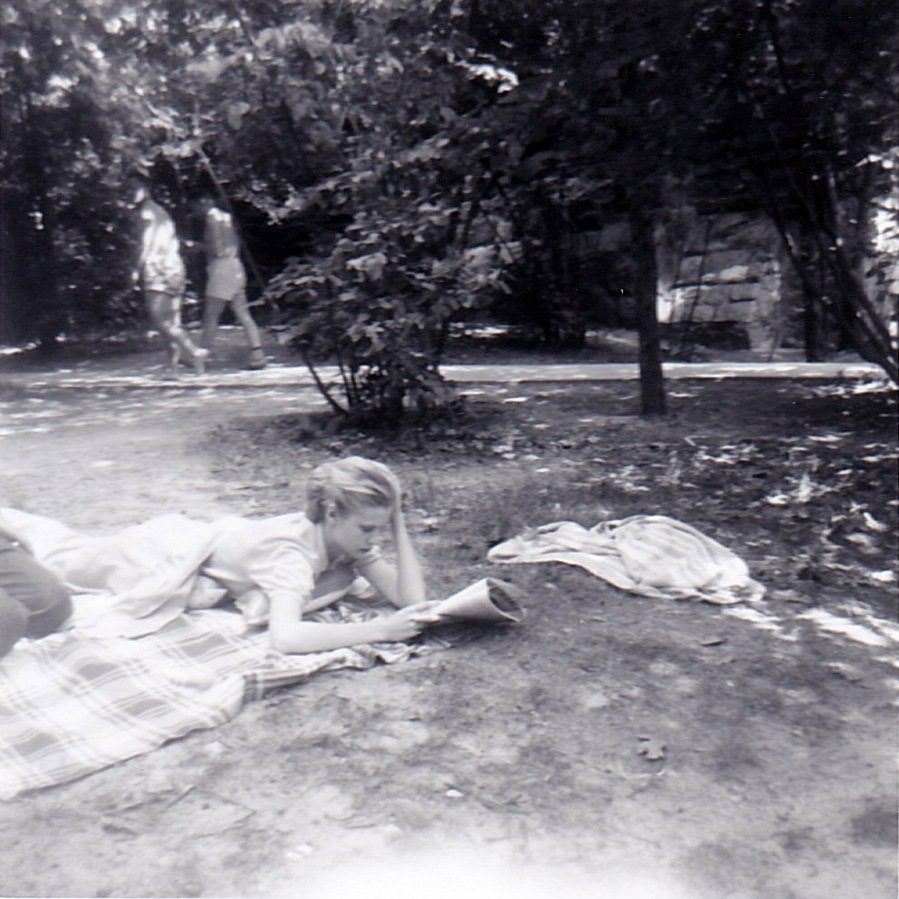
A letter writer asked:
Were you always socially liberal and progressive “on the inside” or did that develop after deconverting? For example, were you always pro-gay marriage, pro-choice, and pro-transgender, and every time you read a bible verse got triggered, or did your social and political beliefs genuinely differ between being a Christian and being an atheist?
These are great questions. I believe the letter writer is asking if I always had liberal/progressive political and social beliefs or did these beliefs develop over time? I believe he is also asking if my political and social beliefs were different as a Christian from the beliefs I now have as an atheist? The best way to answer these questions is to share a condensed version of my life story.
In the early 1960s, my Dad packed up his family and moved from Bryan, Ohio to San Diego, California in search of riches and prosperity. While in California, my parents were saved at Scott Memorial Baptist Church, a Fundamentalist Baptist congregation pastored by Tim LaHaye. As members of Scott Memorial, Mom and Dad joined the right-wing, uber-nationalist John Birch Society. Mom, in particular, immersed herself in right-wing political ideology. She campaigned for Barry Goldwater, and would later actively support the presidential campaigns of Richard Nixon and George Wallace.
As was common for people of their generation, my parents were racists. They believed Martin Luther King, Jr. was a despicable man, a Communist. Mom was an avid writer of letters to the editors of the newspapers wherever we happened to be living at the time. She considered Lieutenant William Calley — the man responsible for the My Lai Massacre during the Vietnam War — to be a war hero. She also thought that the unarmed Kent State students gunned down by Ohio National Guard soldiers got exactly what they deserved.
It should come as no surprise then, that their oldest son — yours truly — embraced their religious and political views. From the time I was in kindergarten until I entered college at age nineteen, I lived in a right-wing, Fundamentalist monoculture. The churches I attended growing up only reinforced the political and social beliefs taught to me by my parents.
In the fall of 1976, I enrolled in classes at Midwestern Baptist College in Pontiac, Michigan. Midwestern was an Independent Fundamentalist Baptist (IFB) institution founded in the 1950s by Tom Malone. While I don’t remember any “political” preaching, Biblical moral beliefs were frequently mentioned in classes and during chapel. I heard nothing that would challenge the political and social beliefs taught to me by my parents and pastors. While at Midwestern, I met a beautiful dark-haired woman who would later become my wife. She had similar political and social beliefs, so from that perspective we were a perfect match.
All told, I spent twenty-five years pastoring Evangelical churches in Ohio, Texas, and Michigan. For many of these years, I was a flag-waving, homophobic, theocratic pro-lifer who believed Democrats, liberals, progressives, Catholics, mainline Christians, and a cast of thousands were tools used by Satan to attack and destroy Christian America. Over time, I theologically moved away from the IFB church movement and embraced Fundamentalist Calvinism. While my theology was evolving, my political and social beliefs remained the same — that is, until 1990.
In late 1990, American tanks, aircraft, and soldiers invaded Iraq, causing tens of thousands of civilian deaths. I was appalled by the universal support Evangelicals gave to the Gulf War. I remember asking congregants if it bothered them that thousands of men, women, and children were slaughtered in their name. Not one of my colleagues in the ministry opposed the Gulf War. None of them seemed troubled by the bloodshed and carnage. Try as I might to see the Gulf War through the eyes of the Just War Theory, I couldn’t do so. It was at this point in life that I became a pacifist. I didn’t preach pacifism from the pulpit, but I did challenge church members to think “Biblically” about war and violence — “Biblically” meaning viewing the Gulf War and other wars through the eyes of Jesus and his teachings.
From this point forward, my political beliefs began to evolve. By the time of the Y2K scare, I had distanced myself from groups such as Focus on the Family, the Moral Majority, and the American Family Association. I thought, at the time, that these groups had become political hacks, shills for the Republican Party. In 2000, I voted for George W. Bush. He would be the last Republican I voted for. In 2004, I voted for John Kerry; 2008 and 2012 I voted for Barack Obama; 2016 I voted for Hillary Clinton, though I was a big Bernie Sanders supporter. in 2020, I voted for Joe Biden, but only because he wasn’t Trump.
In 2005, I left the ministry, and in 2008 I left Christianity. At that time, my political and social beliefs were far removed from when I entered the ministry decades before. I began as a right-wing Republican and I left the ministry as a progressive. Embracing atheism, humanism, rationalism, and science has allowed me to challenge and rethink my beliefs about homosexuality, abortion, euthanasia, same-sex-marriage, LGBTQ people, sex, marriage, birth control, capital punishment, labor unions, environmentalism, and a host of other hot-button issues. As long as I was in the Evangelical bubble, these things remained unchallenged. Once the Bible lost its authority and control over me, I was then free to change my beliefs.
The Bruce Gerencser of 1983 would not recognize the Bruce Gerencser of today. A man who was a member of one of the churches I pastored in the 1980s and remained a friend of mine until 2009, told me that I had changed teams. And he’s right. My change of beliefs has been so radical that this man told me he could no longer be friends with me. Why? He found my atheism and political beliefs to be too unsettling.
I understand how the trajectory of my life, with its changing religious, political, and social beliefs, troubles people. I try to put myself in their shoes as they attempt to reconcile the Pastor Bruce they once knew with the atheist blogger I am today. How can these things be? former congregants, friends, and colleagues in the ministry want to know. How is it possible that Bruce Gerencser, one of the truest Christians they ever knew, is now an atheist? Some people think there’s some secret I am sitting on, some untold reason for my deconversion. No matter how much time I invest in explaining myself, many people still can’t wrap their minds around my current godlessness and liberal political beliefs. I’ve concluded that there is nothing I can do for them as long as they remain firmly ensconced in the Evangelical bubble.
My political and social beliefs are driven by the humanist ideal; that we humans should work together for the common good; that every person deserves peace, health, happiness, and economic security. I support political and social beliefs that promote these things and oppose those that don’t. I certainly haven’t arrived. My beliefs continue to evolve.
For readers not familiar with humanism, let me conclude this post with the Humanist Manifesto. Atheism doesn’t provide me with a moral foundation. Atheism is simply the absence of belief in gods. It is humanism that provides me the foundation upon which to build my life:
Humanism is a progressive philosophy of life that, without supernaturalism, affirms our ability and responsibility to lead ethical lives of personal fulfillment that aspire to the greater good of humanity.
The lifestance of Humanism—guided by reason, inspired by compassion, and informed by experience—encourages us to live life well and fully. It evolved through the ages and continues to develop through the efforts of thoughtful people who recognize that values and ideals, however carefully wrought, are subject to change as our knowledge and understandings advance.
This document is part of an ongoing effort to manifest in clear and positive terms the conceptual boundaries of Humanism, not what we must believe but a consensus of what we do believe. It is in this sense that we affirm the following:
Knowledge of the world is derived by observation, experimentation, and rational analysis. Humanists find that science is the best method for determining this knowledge as well as for solving problems and developing beneficial technologies. We also recognize the value of new departures in thought, the arts, and inner experience—each subject to analysis by critical intelligence.
Humans are an integral part of nature, the result of unguided evolutionary change. Humanists recognize nature as self-existing. We accept our life as all and enough, distinguishing things as they are from things as we might wish or imagine them to be. We welcome the challenges of the future, and are drawn to and undaunted by the yet to be known.
Ethical values are derived from human need and interest as tested by experience. Humanists ground values in human welfare shaped by human circumstances, interests, and concerns and extended to the global ecosystem and beyond. We are committed to treating each person as having inherent worth and dignity, and to making informed choices in a context of freedom consonant with responsibility.
Life’s fulfillment emerges from individual participation in the service of humane ideals. We aim for our fullest possible development and animate our lives with a deep sense of purpose, finding wonder and awe in the joys and beauties of human existence, its challenges and tragedies, and even in the inevitability and finality of death. Humanists rely on the rich heritage of human culture and the lifestance of Humanism to provide comfort in times of want and encouragement in times of plenty.
Humans are social by nature and find meaning in relationships. Humanists long for and strive toward a world of mutual care and concern, free of cruelty and its consequences, where differences are resolved cooperatively without resorting to violence. The joining of individuality with interdependence enriches our lives, encourages us to enrich the lives of others, and inspires hope of attaining peace, justice, and opportunity for all.
Working to benefit society maximizes individual happiness. Progressive cultures have worked to free humanity from the brutalities of mere survival and to reduce suffering, improve society, and develop global community. We seek to minimize the inequities of circumstance and ability, and we support a just distribution of nature’s resources and the fruits of human effort so that as many as possible can enjoy a good life.
Humanists are concerned for the well being of all, are committed to diversity, and respect those of differing yet humane views. We work to uphold the equal enjoyment of human rights and civil liberties in an open, secular society and maintain it is a civic duty to participate in the democratic process and a planetary duty to protect nature’s integrity, diversity, and beauty in a secure, sustainable manner.
Thus engaged in the flow of life, we aspire to this vision with the informed conviction that humanity has the ability to progress toward its highest ideals. The responsibility for our lives and the kind of world in which we live is ours and ours alone.
Bruce Gerencser, 68, lives in rural Northwest Ohio with his wife of 47 years. He and his wife have six grown children and sixteen grandchildren. Bruce pastored Evangelical churches for twenty-five years in Ohio, Texas, and Michigan. Bruce left the ministry in 2005, and in 2008 he left Christianity. Bruce is now a humanist and an atheist.
Your comments are welcome and appreciated. All first-time comments are moderated. Please read the commenting rules before commenting.
You can email Bruce via the Contact Form.


